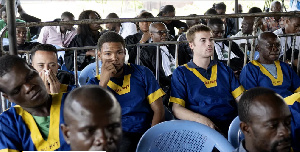- Home - News
- Polls
- Year In Review
- News Archive
- Crime & Punishment
- Politics
- Regional
- Editorial
- Health
- Ghanaians Abroad
- Tabloid
- Africa
- Religion
- Election 2020
- Coronavirus
- Photo Archives
- News Headlines
- Press Release
Press Releases of Wednesday, 1 September 2021
Source: The Water Research Institute
Seed certification system urgently needed to accelerate aquaculture development in Ghana―
The Water Research Institute (WRI) of the Council for Scientific and Industrial Research (CSIR), Fisheries Commission of Ghana (FC), International Food Policy Research Institute (IFPRI), and the Tilapia Seed Project team in Ghana have embarked on a two-day workshop at Forest Hotel, in Dodowa within the Ga East Municipality of the Greater Accra Region.
The purpose of these workshops is to engage stakeholders to review and validate a tiered fish farm certification protocol, share study findings from the Ghana Tilapia Seed Project, and discuss inputs to seed policy development for the aquaculture industry.
The workshop is organized in collaboration with the KIT Royal Tropical Institute of Netherlands (KIT) and the WorldFish (WF), with funding from CGIAR and the Government of Netherlands.
The workshop was designed to sensitize players in the aquaculture industry on the need to adhere to food hygiene and safety standards in determining and ensuring market access and food and nutrition security.
Being the first of three workshops to be organized across the country, it brought together 68 farmers and stakeholders including aquaculture sector regulators and experts from academia, and research in the Eastern, Greater Accra, Volta, and Western Regions.
Dr. Ruby Asmah, a Principal Research Scientist and Head of the Fishery and Aquaculture Division of the CSIR-WRI mentioned that the Tilapia Seed (TiSeed) Project titled "Accelerating Aquaculture Development in Ghana through Sustainable Nile Tilapia Seed Production and Dissemination" has an overall objective to improve the productivity of tilapia cage and pond farming in Ghana.
Giving the overview of the project, the Ghana Project Coordinator, Dr. Seth Koranteng Agyakwah of the CSIR-WRI, mentioned that “the aim of the intervention by the project is to improve the quality and service level of public and private hatcheries whiles increasing knowledge in best aquaculture management practices, access to and use of high-quality fish seed for new or existing small-scale pond and cage producers.”
He reiterated the interventions so far include, review of farm certification protocols, support the training of 9 MPhil/MSc students from various universities, developed and piloting mobile application technology (Fish farm Tracker App) for fish farm management and marketing, training manuals for hatcheries, ponds, and cage farming and training of about 360 farmers.
Other interventions include the development of 16 aquaculture extension materials, census of farmers and hatchery operators, and hatchery capacity assessment among many others in 6 regions (Bono, Bono East, Ahafo, Ashanti, Eastern, and Volta) where the project is being implemented.
“Assessment done on project interventions so far shows positive impacts on improved adoption of good aquaculture practices and increased productivity,” according to Dr. Catherine Ragasa, Tiseed Project Leader and Senior Research Fellow at IFPRI.
Speaking to participants during the workshop, the Head of Inland Fisheries Division of the Fisheries Commission, Mr. Emmanuel Nii Aryee, underscored the urgent need for the right practices to be engaged by farmers to avert the high mortality rate of fingerlings.
He disclosed that since the introduction of the one-fits-all certification protocols in 2017, no aquaculture establishment comprising hatcheries, grow-outs, and feed mills has been certified. ‘’Currently, some existing aquafarms have an environmental permit from EPA, Water use permit from Water Resources Commission, and an operational permit from Fisheries Commission, yet, no farm has been certified’’ said Mr. Emmanuel Aryee.
He attributed this to the “unsuccessful fulfillment” of all the requirements in the certification protocols.
Presenting a summary of the requirements for all the three tiers of the certification system, the acting Head at the Fish Health Unit of the Fisheries Commission, Mrs. Mary Nkansa, indicated that the use of drugs, chemicals, and biologicals such as vaccines and probiotics are not permissible for tier-one (class C), except under supervision by a designated competent official.
However, under tier-two (class B) and tier-three (class A) classification, she noted that the farmer ought to have an appropriate storage facility for drugs and chemicals only. In addition, tier-three (class A) certified fish farms should have appropriate storage facilities for biologicals.
She further added that for tiers―two and three categories, only trained personnel could administer drugs, biologicals, and chemicals. However, the use of hormones, steroids, and antimicrobials as growth promoters is prohibited across all tiers (classes).
Under sanitation of farms, she underscored the need for a yearly review of written risk assessment of the farm and facility.
She said for all three tiers, strict adherence to biosecurity measures on the farm was required in addition to the provision of adequate toilet facilities for both workers and visitors.
To ensure that harvested products remained safe for consumption, farmers were entreated to subject harvested products to what she referred to the as cold chain while harvest and post-harvest equipment were to be cleaned and disinfected with approved chemicals.
Mrs. Nkansa advised that sales of harvested fish should be undertaken in designated areas but not on or near what she termed culture facilities.
Under animal welfare, she advocated the humane handling of all farmed aquatic animals as well as proper records of treatments of diseases and visits by aquatic animal health personnel.
Participants provided very useful suggestions to improve the certification protocol and its potential enforcement. In the coming months, the certification protocol will be finalized, validated, and gazetted by Ghana Standards Authority.
A series of training and sensitization about the certification protocol will then follow. This workshop is a crucial first step to validating and implementing the hatchery and fish farm certification system in the country to support aquaculture development.
















